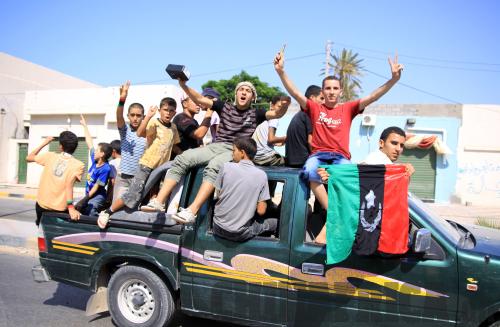|
 |
|
JUBILATION: Libyans celebrate life after Muammar Gaddafi |
When NATO jet fighters dropped the first bomb over Tripoli on March 19, no one expected Libyan strongman Muammar Gaddafi to doggedly resist a combined force of rebel militia and some of the world's most advanced air munitions for more than five months. Yet the combined barrage eventually took its toll and the Gaddafi era has ended.
The fluid situation in Libya changed seemingly overnight. On August 21, the rebels entered Tripoli and announced that the whole of the city was under their control except Gaddafi's Bab Al-Aziziya-Jazeera stronghold. On August 22, Libyan rebel chief Mustafa Abdel Jalil announced "the end of the four-decade Gaddafi era," at a news conference in Benghazi, eastern Libya, in an operation that proved easier than many military experts thought possible.
"The result shows that Gaddafi was previously exaggerating his strength and his troops were not so loyal to him as he previously said," Zhang Bo, a military expert, told The Beijing News.
Filling a power vacuum
The capture of Tripoli brings an end to Gaddafi's 42-year rule over Libya, but not an end to the complicated dynamics of the North African country. "I, and actually the whole international community, question the capacity of the new government, which will be established after Gaddafi, of ruling the country," Xu Weizhong, Deputy Director of the Institute of West Asian and African Studies under China Institutes of Contemporary International Relations, told ChinAfrica. "It requires totally different capacity to overthrow an old regime and to build a new one," he said.
The Transitional National Council (TNC) in Benghazi is a temporary organization established by the rebels to rule the country after Gaddafi steps down. More than 30 foreign governments now recognize this council, including that of the United States and the United Kingdom. On August 22, the Libyan Embassy in China replaced Libya's green flag with the rebel's red, black and green flag.
According to Xu, after ousting the Gaddafi regime, the TNC has to rapidly fill in the power vacuum to rule the country. "But this is a great challenge for the rebels who have no experience of ruling a country," Xu added.
However, despite recognition from many foreign governments, rebel soldiers seem to have less confidence in the TNC. According to a report of the UK-based The Independent on August 22, the rebel fighters in Misrata, who fought so long to defend their city, said that they have no intention of obeying orders from the TNC.
Division in the ranks
This lack of confidence in the TNC could very possibly divide the country. "Once taking power, the rebels still face numerous challenges in ruling the country in the post-Gaddafi era," said Zhang Zhongxiang, Deputy Director of the Department of the West Asian and African Studies at the Shanghai Institutes for International Studies. He told ChinAfrica that if they cannot properly and effectively deal with the remnants of Gaddafi's followers and officials, the country is very likely to descend into chaos, similar to the anarchy in Somalia.
"The differences among factions inside the rebel camp will be a huge problem after they seize the power," said Xu.
According to him, the rebellion consists of several factions including radical Islamic forces, those who insist on Westernization, and local Arabian forces. In the fight to topple Gaddafi they have formed a united front, but once power changes hands, their differences will emerge, said Xu.
The rebels are aware of this. One of their troops, Husam Najjair told Reuters he is worried about the possibility of rebels turning on each other.
"The first thing my brigade will do is set up checkpoints to disarm everyone, including other rebel groups, because otherwise it will be a bloodbath," he said. "All the rebel groups will want to control Tripoli. Order will be needed," he added.
"Despite any measures the rebels may take, conflict among the rebels themselves will be a great issue for post-Gaddafi Libya," said Xu.
|